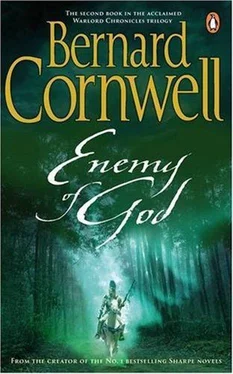Instead it brought them punishment. King Melwas of the Iklgae, a client King who had sided with the Christians who opposed Arthur, was made the new ruler of Cadwy’s land. It was hardly a reward, for it took Melwas far away from his own people to a place where Arthur could keep him under close watch. Nabur, the Christian magistrate who had held Mordred’s guardianship, and who had used that guardianship to raise the party that opposed Arthur and who was the writer of the letters suggesting Mordred’s murder, was nailed to a cross in Durnovaria’s amphitheatre. These days, of course, he is called a saint and martyr, but I only remember Nabur as a smooth, corrupt liar. Two priests, another magistrate and two landowners were also put to death. The last conspirator was Bishop Sansum, though he had been too clever to let his name be put into writing, and that cleverness, together with his strange friendship for Arthur’s maimed pagan sister, Morgan, saved Sansum’s life. He swore undying loyalty to Arthur, put a hand on a crucifix and swore he had never plotted to kill the King, and so remained as the guardian of the shrine of the Holy Thorn at Ynys Wydryn. You could bind Sansum in iron and hold a sword to his throat, and still he would slither free.
Morgan, his pagan friend, had been Merlin’s most trusted priestess until the younger Nimue usurped that position, but Merlin and Nimue were both far away and that left Morgan as virtual ruler of Merlin’s lands in Avalon. Morgan, with her gold mask hiding her fire-ravaged face and her black robe shrouding her flame-twisted body, assumed Merlin’s power and it was she who finished the rebuilding of Merlin’s hall on the Tor, and she who organized the tax-collectors in the northern part of Arthur’s land. Morgan became one of Arthur’s most trusted advisers; indeed, after Bishop Bedwin died of a fever that autumn, Arthur even suggested, against all precedence, that Morgan be named as a full councillor. No woman had ever sat on a King’s Council in Britain and Morgan might well have been the first, but Guinevere made sure she was not. Guinevere would let no woman be a councillor if she could not be one herself, and besides, Guinevere hated anything that was ugly and, the Gods know, poor Morgan was grotesque even with her gold mask in place. So Morgan stayed in Ynys Wydryn, while Guinevere supervised the building of the new palace at Lindinis.
It was a gorgeous palace. The old Roman villa that Gundlcus had burned was rebuilt and extended so that its cloistered wings enclosed two great courtyards where water flowed in marble channels. Lindinis, close to the royal hill of Caer Cadarn, was to be Dumnonia’s new capital, though Guinevere took good care that Mordred, with his twisted left foot, was allowed nowhere near the place. Only the beautiful were allowed in Lindinis, and in its arcaded courtyards Guinevere assembled statues from villas and shrines throughout Dumnonia. There was no Christian shrine there, but Guinevere made a great dark hall for the women’s Goddess Isis, and she provided a lavish suite of rooms where Lancelot could stay when he visited from his new kingdom in Siluria. Elaine, Lancelot’s mother, lived in those rooms and she, who had once made Ynys Trebes so beautiful, now helped Guinevere make Lindinis’s palace into a shrine of beauty.
Arthur, I know, was rarely at Lindinis. He was too busy preparing for the great war against the Saxons, to which end he began re-fortifying the ancient earth citadels in southern Dumnonia. Even Caer Cadarn, deep in our heartland, had its wall strengthened and new timber fighting platforms poised on its ramparts, but his greatest work was at Caer Ambra, just a half hour’s walk east of the Stones, which was to be his new base against the Sais. The old people had made a fort there, but all that autumn and winter the slaves toiled to steepen the ancient earth walls and to make new palisades and fighting platforms on their summits. More forts were strengthened south of Caer Ambra to defend the lower parts of Dumnonia against the southern Saxons led by Cerdic, who were sure to attack us while Arthur assaulted Aelle in the north. Not since the Romans, I dare say, had so much British earth been dug or timber split, and Arthur’s honest taxes could never pay for half that labour. He therefore made a levy on the Christian churches that were plentiful and powerful in southern Britain, the same churches that had supported Nabur and Sansum’s effort to topple him. That levy was eventually repaid, and it protected the Christians from the ghastly attentions of the Saxon heathens, but the Christians never forgave Arthur, nor did they notice that the same levy was taken from the handful of pagan shrines that still possessed wealth.
Not all the Christians were Arthur’s enemies. At least a third of his spearmen were Christians and those men were as loyal as any pagan. Many other Christians approved of his rule, but most of the leaders of the church let their greed dictate their loyalty and they were the ones who opposed him. They believed that their God would one day return to this earth and walk among us like a mortal man, but He would not come again until all pagans had been converted to His faith. The preachers, knowing that Arthur was a pagan, hissed curses at him, but Arthur ignored their words as he made his ceaseless tours of southern Britain. One day he would be with Sagramor on Aelle’s border, the next he would be fighting one of Cerdic’s war-bands as it probed deep into the river valleys of the south, and then he would ride north through Dumnonia and across Gwent to Isca where he would argue with local chieftains about the number of spearmen who could be raised from western Gwent or eastern Siluria. Thanks to Lugg Vale Arthur was now far more than Dumnonia’s chief lord and Mordred’s protector; he was Britain’s warlord, the undisputed leader of all our armies, and no King dared refuse him, nor, in those days, wanted to.
But all this I missed, for I was in Caer Sws and I was with Ceinwyn and I was in love. And waiting for Merlin.
Merlin and Nimue came to Cwm Isaf just days before the winter solstice. Dark clouds were pressing close above the bare oak tops on the ridges, and the morning frost had lingered well into the afternoon. The stream was a patchwork of ice ledges and trickling water, the fallen leaves were crisp and the valley’s soil as hard as stone. We had a fire in the central chamber so our house was warm enough, though it was choking with the smoke that billowed about the un-trimmed beams before finding the small hole in the roof’s ridge. Other fires smoked from the shelters that my spearmen had made across the valley; stout little huts with walls of earth and stone supporting roofs of timber and bracken. We had made a beast shed behind the house where a bull, two cows, three sows, a boar, a dozen sheep and a score of chickens were penned at night to protect them from the wolves. We had plenty of wolves in our woods and their howling echoed at every dusk, and at night we would sometimes hear them scrabbling beyond the beast shed. The sheep would bleat piteously, the hens would set up a cackling panic, and then Issa, or whoever else stood guard, would shout and hurl a firebrand into the wood’s edge and the wolves would skitter away. One morning, going early to fetch water from the stream, I came face to face with a big old dog wolf. He had been drinking, but as I stepped out of the bushes he raised a grey muzzle, stared at me, then waited for my salute before he loped silently upstream. It was, I decided, a good omen and, in those days as we waited for Merlin, we counted the omens. We also hunted the wolves. Cuneglas gave us three brace of longhaired wolfhounds that were bigger and shaggier than the famous Powysian deerhounds like those Guinevere kept in Dumnonia. The sport kept my spearmen active and even Ceinwyn liked those long cold days in the high woods. She wore leather breeches, high boots and a leather jerkin, and hung a hunter’s long knife at her waist. She would braid her fair hair into a knot at the back of her head, then scramble up rocks and down gullies and over dead trees behind her brace of hounds who were leashed on long horsehair ropes. The simplest way to hunt wolves was with a bow and arrow, but as few of us possessed that skill we used the dogs, war spears and knives, and by the time Merlin returned we had a pile of pelts stacked in Cuneglas’s store hall. The King had wanted us to move back to Caer Sws, but Ceinwyn and I were as happy as our anticipation of Merlin’s ordeal allowed us and so we stayed in our small valley and counted the days. And we were happy in Cwm Isaf. Ceinwyn took a ridiculous pleasure in doing all the things that till now had been done for her by servants, though strangely she was never able to wring a chicken’s neck and I always used to laugh when she killed a hen. She had no need to do it, for any one of the servants could have killed the fowl and my spearmen would do anything for Ceinwyn, but she insisted on sharing the work, though when it came to killing hens, ducks or geese she could not make herself do it properly. The only method she ever devised was to lay the poor creature down on the earth, put a small foot on its neck and then, with her eyes tight closed, give the head one quick decisive tug. She was more successful with the distaff. Every woman in Britain, save for the very richest, was forever with a distaff and spindle, for spinning wool into thread was one of those endless jobs that will presumably last until the sun has made its last turn about the earth. As soon as one year’s fleeces had been turned into yarn, so the next year’s fleeces came to the storehouses and the women would collect their apronfuls, wash and comb the wool, then start spinning the thread again. They spun when they walked, they spun as they talked, they spun whenever there was no other task needing their hands. It was monotonous, mindless work, but not unskilled; at first Ceinwyn could only produce pathetic little tatters of wool, but she became better, though never as quick as those women who had spun the wool since the very first day their hands were big enough to hold the distaff. She would sit of an evening, telling me about her day, and her left hand would turn the staff and her right would flick the weighted spindle that hung from the distaff to elongate and twist the emerging thread. When the spindle reached the floor she would wind the thread around it, fix the spooled yarn with the bone clip on the spindle’s top and then start spinning again. The wool she made that winter was often lumpy, or else fragile, but I loyally wore one of the shirts she made from that thread until it fell apart.
Читать дальше












